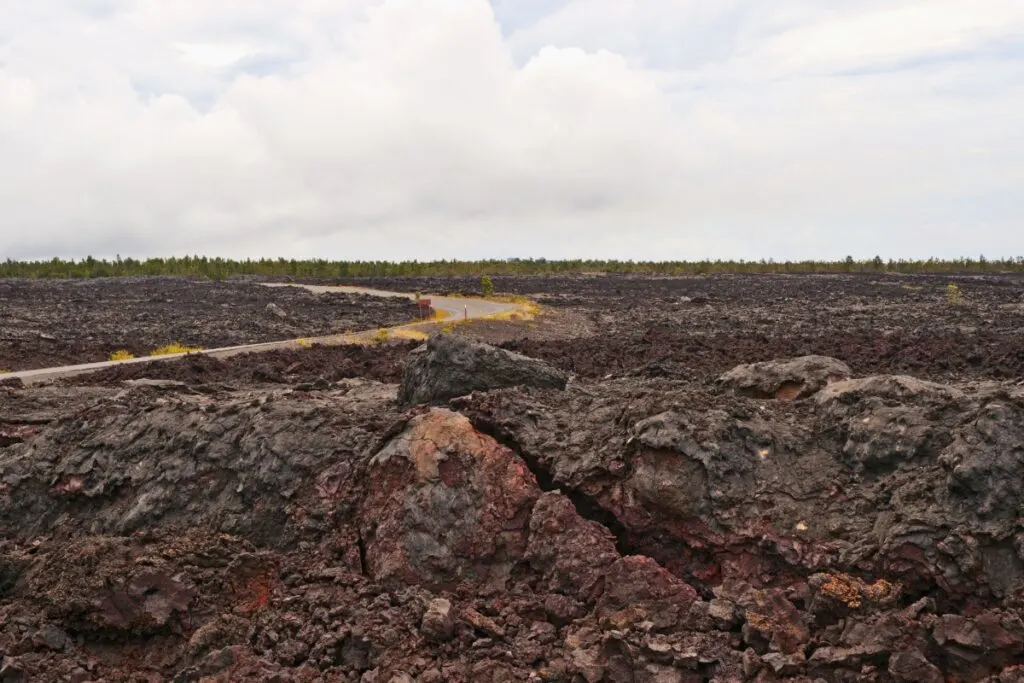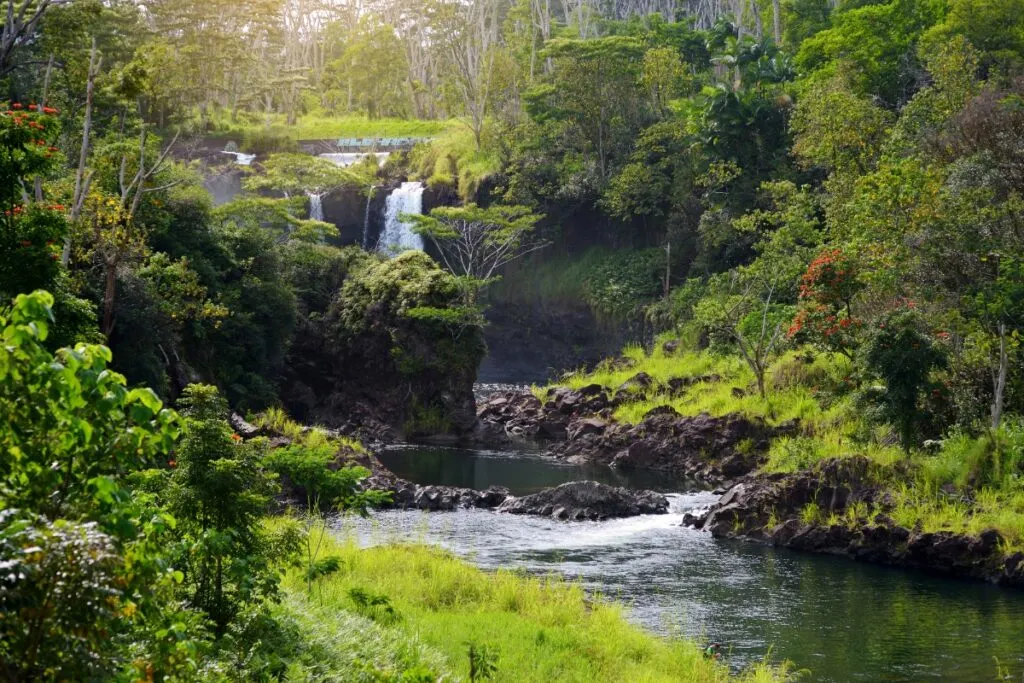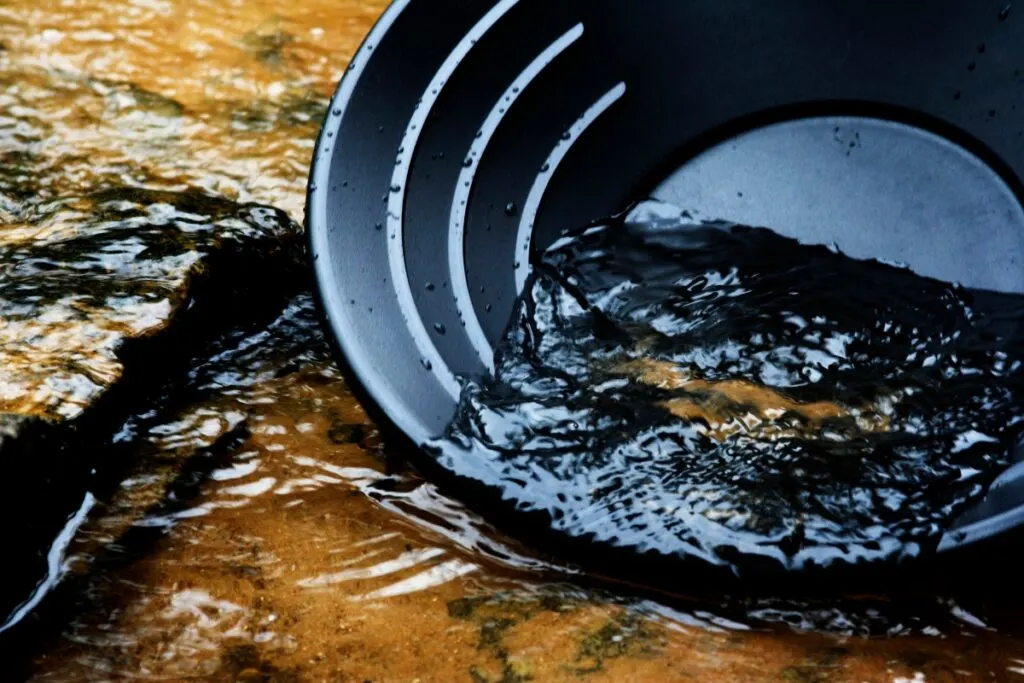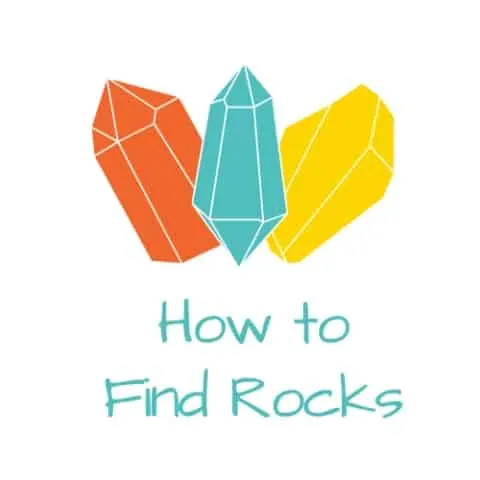As an Amazon Associate, I earn from qualifying purchases with no additional costs for you.
The Hawaiian Islands are not your typical gold prospecting grounds. These are volcanic islands, born of fire and brimstone, erupting from the depths of the Pacific Ocean. As a result, the mineral wealth here is quite different from what you’d find on the mainland. While the Hawaiian islands don’t boast vast gold deposits like California or Alaska, that doesn’t mean you can’t strike it rich here.
In this comprehensive guide, we’ll dive into the art of gold panning in Hawaii, revealing five of the best spots to search for this precious metal. Additionally, we’ll demystify the legal aspects of gold prospecting, ensuring your treasure hunt is both fun and law-abiding.

If you want to check out the best tools and equipment for gold prospecting, you can find them by clicking here (Amazon link).
The Legality of Gold Prospecting in Hawaii
Hawaii has strict rules regarding its natural resources. The state constitution mandates that all natural resources are held in trust by the state for the benefit of its citizens. Additionally, stringent land use regulations are in place to protect the islands’ unique and fragile ecosystems.
You might run into trouble if you’re thinking about panning for gold on a public beach. State or county parks departments protect many beaches in Hawaii, and you’d likely need a permit to conduct activities that might disturb the natural environment.
Even then, it’s doubtful that they would issue a permit for gold prospecting. The federal laws come into play if you’re considering prospecting in places like national parks.
As for private lands, the situation doesn’t get much easier. You would need the landowner’s explicit permission to prospect on their property. Additionally, any gold you find could belong to the landowner, depending on your agreement.
5 Best Places to Find Gold in Hawaii
Discover the allure of the Aloha State beyond its beaches! Dive into Hawaii’s rich history and landscapes as we reveal the top spots to uncover hidden gold treasures. Here are the top 5 best places to find gold in Hawaii:
Gold Souks
The Gold Souks in Hawali, You can’t talk about gold in Hawali without starting with the gold souks. Like many places in the Middle East, Hawaii is known for its traditional gold souks or marketplaces. Here, gold isn’t hidden beneath the Earth – it’s displayed in resplendent glory for all to see.
Rows upon rows of shops showcase gold jewelry of all sorts, from the most intricate designs to simple, elegant pieces, and bustling marketplaces with many gold jewelry stores lined up.
The variety is almost overwhelming, from dainty, delicate designs to bold statement pieces. Engage in a little bartering; you might walk away with a shiny trinket at a great price. Always start by offering half the price and work your way from there.
Wadis and Streams
The Wadis and Streams, we’re talking about the Wadis, valleys where streams meander. The process of erosion releases minerals and creates placer deposits. Bring a gold pan and some patience – it’s like fishing, but for gold!
Gold isn’t only found in souks. It’s in the soil as well. For geology enthusiasts, Hawali’s wadis (valleys) are the real goldmines. Streams flowing through the wadis erode the rocks, releasing minerals and creating placer deposits.
These deposits sometimes contain small particles of gold. While these specks of gold may not make you rich overnight, they’re a testament to the Earth’s incredible ability to create and transform materials.
TIP: Find out my recommended products if you are looking for the best tools you need to find gold (Amazon link):
- Gold Metal Detector: Bounty Hunter TK4 Tracker
- Gold Pan: Stansport Deluxe Gold Pan
- Sluice Box: Stansport Aluminum Sluice Box
- Shovel: Radius Garden Carbon Steel Shovel
- Snuffer Bottle: Stansport Snuffer Bottle
Banks and Financial Institutions
Banks in Hawaii offer gold investment options, and it’s as simple as walking into a bank and expressing your interest. The choice is yours for gold bars, coins, or investment accounts. If you’re thinking long-term and less “Indiana Jones,” this is the perfect avenue to find your gold.
If you’re more interested in the financial aspects of gold, then banks and financial institutions in Hawaii might be your cup of tea. offer gold investment options like gold bars, coins, or even gold investment accounts.
Digital Gold
Digital Gold Welcome to the 21st century, where even gold has gone digital. Gold-backed cryptocurrencies are gaining popularity in Hawaii.The realm of digital currencies.
In this age of technology, gold is not just physical. Digital gold, or gold-backed cryptocurrencies, can be traded online, and yes, you can find them in Hawaii as well. It’s a modern twist on an ancient commodity.
Think of it as a digital version of the physical gold in a bank’s vault. It’s an exciting new way to own and trade gold without ever having to see or touch it.
Cultural Gold
The Cultural Gold. The cultural treasures of Hawaii are as valuable as gold. Explore the rich traditions, historical sites, and local stories passed down through generations. Visit museums, attend cultural festivals, or simply engage with the locals.
This is a different kind of gold, one that enriches your soul. With its rich heritage, Hawaii is a treasure trove of stories, traditions, and experiences that are as precious as gold.
TIP: Simple gold panning is among the most allowed gold prospecting techniques you can use almost anywhere. Check out other effective methods in the article below:
The 7 Most Effective Gold Prospecting Techniques Explained
Active, Old & Abandoned Mines
In this section, we’ll delve into Hawaii’s active, old, and abandoned mines. Let’s explore notable mines throughout Hawaii and identify their current status.
Halawa Manganese Mine (Abandoned)
The Halawa Manganese Mine Is Located on the island of Oahu. The Halawa Manganese Mine was once a critical source of manganese ore, primarily used in steel production.
Active from the 1920s to the 1940s, the mine was instrumental in meeting the increasing demand for this essential metal during its operation.
The Halawa Manganese Mine has been inactive for several decades, and the mine’s entrances have been sealed off. Although it remains a relic of Hawaii’s mining history, the site is no longer accessible for exploration.
Kauai Sulfur Mine (Inactive)
The Kauai Sulfur Mine Is Situated on the island of Kauai, near the Hanapepe River. The Kauai Sulfur Mine extracted valuable sulfur deposits in the early 1900s. Sulfur has many applications, including producing fertilizers, chemicals, and pharmaceuticals.
The Kauai Sulfur Mine has been closed for many years. While the site no longer functions as an active mine, its historical significance is remembered and serves as a testament to Hawaii’s varied mining past.
Mauna Kea Adz Quarry (Old)
The Mauna Kea Adz Quarry is located on the slopes of Mauna Kea on the Big Island. This site was an essential source of basalt for native Hawaiians. The mined basalt was skillfully crafted into adzes, versatile tools similar to axes used for various tasks.
The Mauna Kea Adz Quarry is now a National Historic Landmark, protected and preserved for its cultural and historical significance. As a testament to the ingenuity of early Hawaiians, the quarry continues to provide valuable insights into the island’s rich history.
Kahuku Coal Mine(inactive)
The Kahuku Coal Mine is Located on the island of Oahu. The Kahuku Coal Mine was once a critical source of coal, primarily used for fuel and energy production.
Active during the late 1800s and early 1900s, the mine played a significant role in meeting the island’s energy needs during its operation.
The Kahuku Coal Mine has been inactive for over a century. While coal mining no longer occurs on the island, the site holds historical significance as part of Hawaii’s industrial past.
TIP: Starting your gold prospecting journey depends on your seriousness and knowledge. Check out the ultimate guide on starting gold prospecting in the article below:
Ultimate Beginner’s Guide: How To Start Gold Prospecting
Gold Prospecting Clubs in Hawaii

Joining a gold prospecting club can be an excellent way to learn more about gold panning, network with other enthusiasts, and gain access to exclusive prospecting areas. Here are some prominent gold prospecting clubs in Hawaii:
Hawaiian Gold Prospectors Association (HGPA)
The Hawaiian Gold Prospectors Association is Hawaii’s oldest and largest gold prospecting club. Founded in 1978, the HGPA is renowned for its tight-knit community of gold seekers and their adventurous spirit. The HGPA welcomes enthusiasts of all levels.
There’s nothing quite like sifting through a mountain stream and finding that first glimmering nugget of gold, and the HGPA will show you how it’s done.
HGPA provides enthusiasts with the opportunity to share knowledge and prospecting techniques. Come rain or shine, they are there, ready to dive into the world of gold prospecting.
Maui Gold Seekers
The Maui Gold Seekers are determined to find gold on every beach of this beautiful island. Launched in 1990, this enthusiastic group organizes weekend beach outings where members learn to use sluice boxes and high-tech equipment to sift through the sands for elusive gold particles.
With barbecues, picnics, and campfires, these outings aren’t just about gold; they’re also about sharing the aloha spirit and forging lasting friendships.
Whether you’re a seasoned gold digger or just curious about the process, the Maui Gold Seekers will welcome you with open arms.
TIP: Hawaii is a beautiful state where rockhounds can enjoy collecting various specimens while leaving the U.S. mainland. Find out more in the article below:
Rockhounding in Hawaii: Best Locations & What You Can Find
Big Island Prospectors
The Big Island Prospectors pride themselves on their eco-friendly approach to gold prospecting. They organize eco-tours through the lush jungles of the Big Island, teaching members how to prospect responsibly.
As you prospect, the club’s experienced guides share their knowledge of local flora and fauna, adding an educational twist to the adventure.
As a member of the Big Island Prospectors, you’ll have the satisfaction of knowing that you’re exploring Hawaii’s hidden treasures in an environmentally responsible manner.
Golden Wahines of Hawaii
The Golden Wahines of Hawaii. This all-women club was formed to inspire and empower women to take up gold prospecting. With monthly workshops and seminars led by experienced female prospectors, the Golden Wahines are breaking barriers in a male-dominated field.
Join them on a prospecting expedition and witness the excitement as members uncover golden flakes and nuggets.
As a member of the Golden Wahines, you’ll learn the ins and outs of gold prospecting and become part of a sisterhood that celebrates and supports women in the field.
TIP: Nothing in this world is impossible, and finding gold in your backyard is rare but can never be ruled out. Find out helpful tips in the article below:
Guide: PRO Tips On How to Find MORE Gold in Your Backyard
Gold Panning Tours in Hawaii
These tours typically provide the necessary equipment and guidance from experienced prospectors, ensuring a fun and educational experience. Here are some gold panning tours in Hawaii:
Hana Gold Rush Adventure
The Hana Gold Rush Adventure is Located in Hana, Maui. Inspired by the stories of early prospectors, Hana Gold Rush Adventure pays homage to Hawaii’s history with gold exploration.
Some even believe that the legendary pirate Jean Lafitte buried his treasure in the hills of Hana. Pan for gold in the secluded streams surrounded by lush tropical rainforest.
While you might not find any pirate treasure, the experience of searching for gold flakes amidst the backdrop of cascading waterfalls and vibrant flora is genuinely unforgettable.
The tour includes an exploration of Hana’s heritage and local stories and visiting a traditional Hawaiian farm where you can taste exotic fruits and witness organic farming practices.
Big Island Gold Prospecting
The Big Island Gold Prospecting is Located in Kailua-Kona, Big Island. Big Island Gold Prospecting takes you on a journey through the gold-rich volcanic soils of the island, inspired by the tales of gold miners who arrived in Hawaii in the 19th century.
Embark on a scenic off-road adventure to reach the secluded gold panning sites. Learn the art of panning from experienced guides and immerse yourself in the thrill of discovering shiny gold specks in your pan. Enjoy a traditional Hawaiian lunch and sample local coffee on this exciting tour.
Oahu Gold Fever Tour
The Oahu Gold Fever Tour is Located in Oahu, near Honolulu. The Oahu Gold Fever Tour plays on this exciting lore, offering participants a taste of the pirate’s life. Feel the rush of excitement as you sift through the sand and uncover the glinting gold that awaits.
The tour includes a dramatic pirate-themed performance, gold panning lessons, and exploring Oahu’s stunning coastline.
TIP: The gold sluice box is a time-saving alternative to the traditional panning for gold. Check out helpful tips on using the sluice box correctly in the article below:
Find More Gold: Tips On How To Use Sluice Box Properly
Gold Prospecting Law: ls Gold Panning Legal in Hawaii?

Gold panning is legal in Hawaii, but you must follow certain regulations and rules to ensure that your prospecting activities comply with state and federal laws. Here are some key points to consider when gold panning in Hawaii:
Public Lands
The vast majority of land in Hawaii is either state or federally owned, with the remaining privately owned. The legality of gold panning on public land varies by jurisdiction.
Gold prospecting might be permitted on federal lands, but it’s essential to check with the specific agency overseeing the area where you intend to search.
Similarly, state laws might permit gold panning on state-owned lands, but permissions and permits might be required. If you’re considering panning in a state park, check with the Hawaii Department of Land and Natural Resources.
Private Property
If you’ve got your eye on private property for gold panning, you’ll need permission from the landowner.
Doing so ensures you’re complying with the law and shows respect for private property rights. Remember, gold found on private property belongs to the landowner, so ensure you’re clear on the arrangement.
Environmental and Cultural Considerations
Hawaii is renowned for its stunning natural beauty and unique cultural heritage. As a gold prospector, you must be mindful of the environment and respect any cultural sites you encounter.
Follow the principles of “Leave No Trace,” avoid disrupting wildlife, and refrain from damaging any archaeological or cultural artifacts.
TIP: Gold panning is legal in the U.S. however, you must remember that every state has gold panning laws. Find out the complete guide on gold panning law in the article below:
Complete Guide: Is Gold Panning Legal & Where Can You Pan?
Tips on Getting a Gold Claim in Hawaii
If you’re serious about gold prospecting in Hawaii, you might consider taking a gold claim. Here are some tips to help you get started:
Understanding the Basics of Gold Claims
A gold claim is a portion of land where a person has the exclusive right to prospect, mine, and sell gold. While more known for its beautiful beaches and active volcanoes, Hawaii also has some mineral wealth, including gold.
Familiarize Yourself with the Geology of Hawaii
The geology of Hawaii is unique due to its volcanic origins. The archipelago results from magma from the Earth’s mantle erupting onto the ocean floor and forming islands.
Gold often forms near volcanic activity. It’s crucial to do thorough research and possibly consult a geologist.
Understand the Legalities
These matters are not just intricate but also highly important. Brush up on the Mining Law of 1872, as amended, which governs gold claims in the U.S. Most of the land is either state-owned or privately owned, so understanding the local regulations is necessary.
Staking Your Claim
Staking your claim involves marking your desired area with physical stakes and filing a claim with the Bureau of Land Management (BLM) or the local state agency, if applicable. Ensure you’re not encroaching on someone else’s claim or protected lands.
Time to Prospect
Time to roll up your sleeves and start prospecting. Consider using methods like panning, sluicing, and metal detecting. You never know. The next big find could be just a few feet below the surface.
Mining and Environmental Responsibility
If you strike gold, you might be eager to start mining. However, it’s essential to be environmentally conscious. Mining can have adverse effects on the land and water.
Adhere to sustainable practices and comply with environmental regulations. After all, the beauty of Hawaii should be preserved for generations to come.
Selling Your Gold
Once you’ve got your gold, it’s time to cash in. You can sell your gold to dealers at auctions or online. Just ensure you’re getting a fair price.
TIP: Find out my recommended products if you are looking for the best tools you need to find gold (Amazon link):
- Gold Metal Detector: Bounty Hunter TK4 Tracker
- Gold Pan: Stansport Deluxe Gold Pan
- Sluice Box: Stansport Aluminum Sluice Box
- Shovel: Radius Garden Carbon Steel Shovel
- Snuffer Bottle: Stansport Snuffer Bottle
Wrapping up
While Hawaii may not be the most promising location for gold prospecting, the beauty and serenity of the islands make it a worthwhile destination for any adventurer.
If you decide to try your luck gold panning in Hawaii, always follow the rules and regulations, and respect private property rights. Happy prospecting.
TIP: You need to know how gold deposits occur to understand which rocks to look for when prospecting. Find out more in the article below:
5 Rocks You Need To Look For When Gold Prospecting (+ Why)
